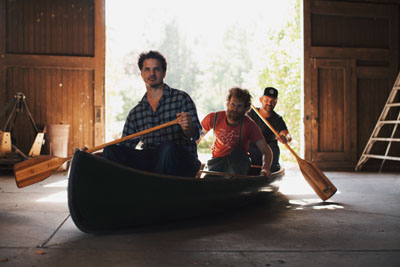
Photo by Allen Ralph
Chad Stokes is the frontman of roots rock trio Dispatch and, apparently, a student of American history. Chatting between tour dates, Stokes mentions that he and the rest of the band recently took a field trip to a few Civil War battle sites in Richmond, Virginia. He cites the mid-1800s as his preferred area of study, but that doesn’t mean he’s living in the past. In fact, Dispatch continues to be one of the most politically active bands in the jam scene, speaking out on a regular basis about current issues ranging from criminal justice reform to gun control to immigration policy.
According to Stokes, their forthcoming record Location 13 tackles these present political hurdles as well as his own inner world, balancing themes of personal experience with humanitarianism.
Below Stokes discusses his affinity for Northern California’s Panoramic Studios, his experience performing at a juvenile detention center and the songs that make up Location 13.
Dispatch is sharing a new song every few weeks until you release your new record, Location 13. What inspired that model?
As much as we love to do albums and eventually this will come together into an album, as a fan in today’s climate with so much music, I would be into a band releasing kind of piecemeal like that. With technology these days, the pace of our lives is so fast. So just to give up only a little bit of time seems like a good model in today’s music world. And it’s been kind of fun doing it that way, but it goes against some kind of traditional models.
You recorded parts of this record and your previous one at Panoramic House in Marin County, Calif. Can you talk a little bit about the locale of that studio influenced the record?
It’s funny because the songs were all written on the East Coast, rehearsed in this barn and written in a small cottage in the winter. It was freezing. And I think Brad [Corrigan] from the band was like, “Please can we swing West a little bit?” So I gave in and that studio is so incredible. It’s just magical. This guy built it by hand with old cobblestones from San Francisco streets. He was an old school teacher in the ‘60s and just built this little fortress halfway up the mountain.
And being from the East coast and watching the sunset every day over the Pacific ocean is just totally mesmerizing.
One song in particular is very much influenced by the builder of Panoramic house, right? Can you discuss the process of writing that one?
Yeah, “Came for the Fire.” Before we went to the studio the lyrics weren’t fully formed. We needed another verse. Up to that point, it was basically about me and my wife and the trials and tribulations of our 20 year relationship. We all decided that we needed some more, and I was just so inspired by his story and kind of wondered about this man and his relationship with his wife, building that dream house and the obsession that he must have had. Because that’s the way it feels when you’re in there, it’s so unique that you can’t help but think that this guy was slightly obsessed with this building. You can see hand tools that are still stuck in the grass all rusted away after 40 years that are still there. It almost feels like it was interrupted, like he was almost finished when he ran out of money. So there is that heaviness to it. While it is so magical and whimsical, there is also that dream following mission that can lay everything else to waste.
You mentioned earlier how “Came For The Fire” is partly inspired by you and your wife’s relationship, but the Dispatch sound is usually pretty political. What was the balance on this record between activism and your own personal experience?
It is always a balance. In my early days, especially with State Radio, it was pretty much all political. And then when I did my first solo record, I was finally ready to get more personal with my writing and just my own story of growing up on this small family farm. I think I’ve been a little cagey with my personal stuff, you know from the early days, but have gotten more comfortable with that in days of late. This new batch of songs has “Letter to Lady J” which is probably the most overtly political. It’s written about police brutality and lack of accountability and African American profiling, and how these innocent men and women continue to be victims of this over-use of authority and violence. And so there’s that mixed with “Came for the Fire,” which is relationship stuff.


No Comments comments associated with this post